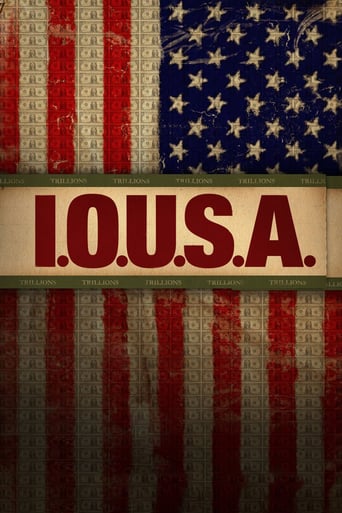LouHomey
From my favorite movies..
Brendon Jones
It’s fine. It's literally the definition of a fine movie. You’ve seen it before, you know every beat and outcome before the characters even do. Only question is how much escapism you’re looking for.
Rio Hayward
All of these films share one commonality, that being a kind of emotional center that humanizes a cast of monsters.
Sameer Callahan
It really made me laugh, but for some moments I was tearing up because I could relate so much.
moselekm
I am no political graduate or major in economics, but I do believe that the average 'Joe American' can certainly put two and two together and realize that America is in a crisis. Watching this film over a year after it's release just makes it even scarier.I don't have much to say on the film. It does a good job on explaining the American Debt, giving some (and enough) details on how it all started (1776) and to now. It gives solid details on what led to the current state of Federal Debt and it issues out 'how to solve' this problem.Really, the pathetic thing (not of the film, but on congress) is that the SOLUTIONS, which are proclaimed radical by the 'back of the box summary' are extremely blatant and common sense.
mattwsherman
This film does a very good job at scaring people. Some of the figures and projections are bone-chilling. However, it largely overstates the problem. We've handled deficits before. We ran an enormous deficit during the WW-II era (over 100% of GDP), so the current deficit (around 3% of GDP) is not a "fiscal cancer" as the IOUSA team would have you believe.More importantly though, the film missed an opportunity to offer a real solution to the deficit problem -- health care. If our country's health care system were as efficient as the systems in other industrialized countries, and if programs like Medicare/Medicaid could take advantage of these lower costs, our deficit problem would virtually disappear. The Center for Economic and Policy Research has a nice graphic that demonstrates this well: http://www.cepr.net/calculators/iousadeficit/calc_iousa_deficit.html
jbell2005-1
This movie is not for policy wonks, economists, or accountants. It's for citizens of the United States - Highly Patriotic citizens who want to preserve their country.It spells out in superb graphics what we're up against financially. The film has a great pace, lots of color, and combines all sorts of mediums to make an excellent presentation of the information.The message is dark, but brutally honest. And there is yet hope, so I encourage you to see the movie to find out what it is.I am absolutely convinced if the electorate saw and understood these issues, we would be willing to make the hard choices quite gladly, and reward politicians who were clear, transparent and honest, and send packing those who's egos and greed keep them in Washington.What ever happened to civil service as a moral ideal?
pazu7
In the blurb for this film they describe it as discussing the problems and solutions. I saw very accurate portrayal of the problems we face, but must have missed the talk of solutions. I would agree that this film is important and non-partisan. However, I did notice some elements missing in their equation for disaster, and what I interpret a subtle bias towards privatization. While they are critical of Americans for spending beyond their means, there is really no mention of the outsourcing of labor and the effect of falling wages as our economy becomes Walmartized. Nor was there any mention of the insane cost of private health care and the effect that has on average families. How can one criticize Americans for not saving without covering ALL the economic factors at play?I also feel the film is rather flippant with the effect of corporate tax cuts on the overall economy and, while they factored in Iraq, they did not include the peripheral cost of the war. Due to these omissions and what I see as a bias towards privatization, I only gave it a 7.So while I believe this is an crucial discussion and informative film, I think there is something missing. And why they would choose to feature Greenspan is beyond me.

